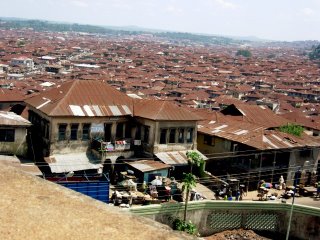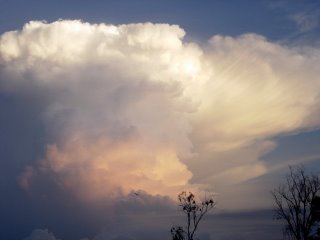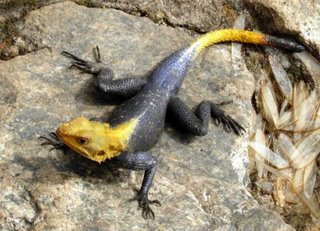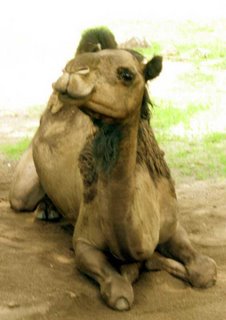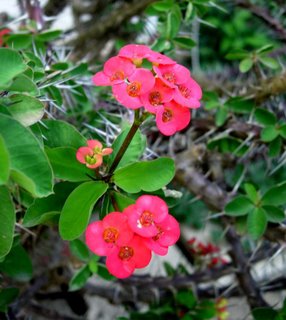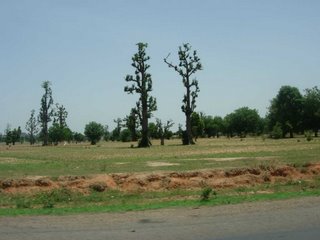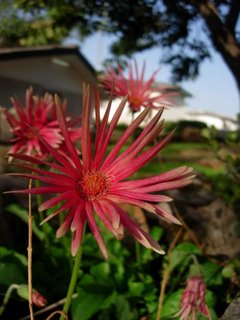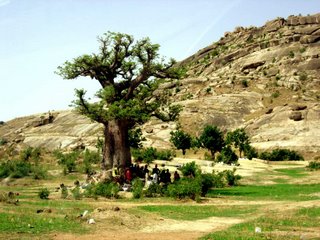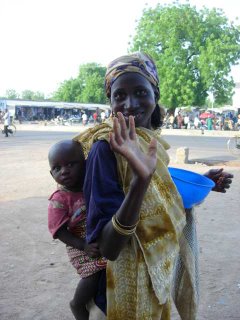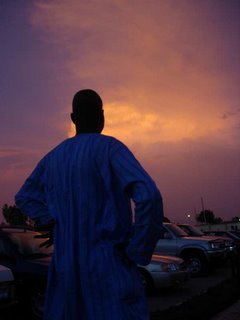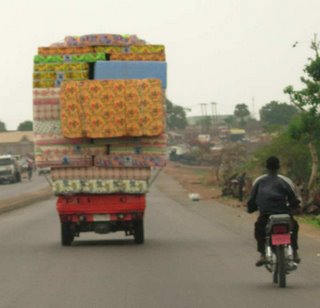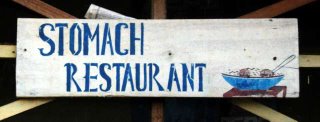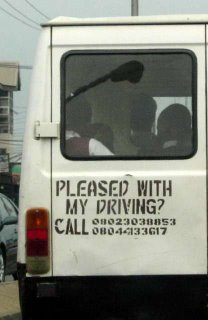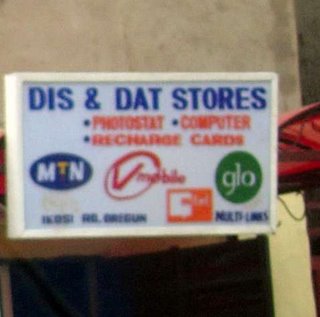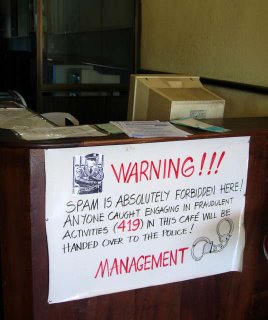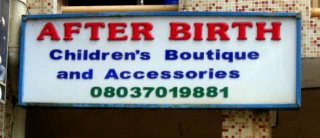We were late taking off from
Abuja Sunday evening, so we didn’t arrive at the small airport in Yola until about 10 p.m. I was excited because I was certain that I could see the
Benue River below us as we were landing. It’s the mighty river that joins the
Niger and forms the right arm of a big letter “Y”. They call ot the northeast, but actually, Yola, in the is about as far east as you can go without tripping and landing in
Cameroon. And it’s about dead center on
Nigeria’s north-south axis.
A local contact and one of the participants in the next day’s seminar met us and drove us to Yola International Hotel. It sounded like we were in for an experience that would be a cut or two above some of the other venues. But it would turn out to be and experience that would showcase the trickle-down effect of the election fraud and political corruption we were there to empower journalists to write about.
It’s funny how after only two weeks in Nigeria I had already jettisoned the expectation of so many of the little niceties that we all take for granted – you know, things such as continuous electricity, on-demand tap water and even towels and toilet paper. It wasn’t alarming, then when one of the employees led us up a maze of nearly pitch-black stairways and down equally dark hallways to our “diplomatic suites.”
It was clear that the hotel was massive in size – another reason for optimism.
He was able to find the right keys in the dark and quickly turn on a light in my room. At first glance, I thought of the once-luxury hotel I’d stayed at in Havana more than 20 years ago. It had been built by a U.S. hotel chain but after the revolution in 1959 had seen practically no maintenance.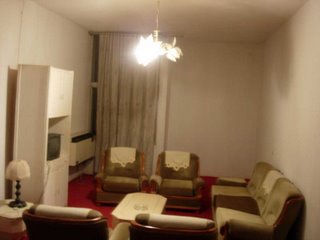
This one seemed to have been locked in a time warp for even longer. There was no was I was going to sit on the old sofa or the overstuffed armchairs – too many things could have taken up residence inside. There was a TV with rabbit ears that could hear nothing. There was water, but it was in two big plastic barrel tubs.
Murky, dirty water.
I had bought a couple of those submersible electrical elements that heat water, so I knew I would have hot water of some sort in the morning – even if the water didn’t start flowing from the taps.
Indeed, the shower was more of a sponge bath with a towel. I washed my hair by pouring the heated water over my head as I knelt by the tub. The only shower was the baby powder that cascaded down my back and legs.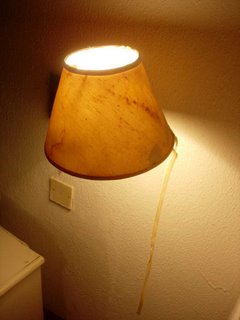
It was light now, so I was able to retrace my steps and find the lobby. The woman at the front desk pointed me toward the restaurant. I found a dark room with a lot of tables, but no customers and no employees in sight. Back to the desk.
This time a young man accompanied me back to the same room and went in search of a waitress. He left me alone with her.
“Good morning. Can I buy some breakfast?”
I don’t like clichés, but the deer in the headlight really says it best. When she didn’t respond, I started giving examples.
“You know. Eggs maybe? Some bread? Maybe even butter?”
I think she muttered, “Let me check?” but I’m not sure. She returned just a moment later and spoke more clearly.
“No. I checked with the kitchen and we have no food.”
OK. I returned to the front desk and politely asked the women at the desk if there was an alternative to the restaurant. They said there wasn’t.
This is going to sound a lot more sarcastic than my actual tone, but I said, “Help me with this, please. When all the people who sleep in all of these rooms get up in the morning and they want to eat, where do they go?”
“They usually eat in the restaurant,” she said sort of proudly. Then she frowned a bit and said, “But it’s not working today.”
No time for explanations – I need something to fuel my energetic and flamboyant presentation today.
“Is there a way to get a bottle of Coke?”
She spoke in a local language to some of the other employees standing around.
“One of the men can ride to town and buy you a Coke, but only this time.”
With a “never mind” I strolled outside to ponder whether to consume my emergency half-can of processed potato chips or my emergency M&M Peanuts (covered with a thin candy shell) this early in what would be a six-day journey outside the capital.
When I walked around to the backside of the hotel, however, I was taken aback by the view of the river. It seemed to encircle the promontory on which I was standing on three sides. There were lush-looking islands and I could see men standing at rear of long boats or canoes. But they were just tiny specks.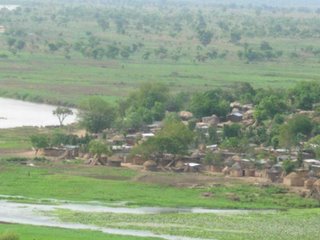
And then I saw the village. Round huts made of straw or something – no roads or cars in sight. It was right up against the water. It was what I had dreamed of seeing and I knew I had to go there.
I reported to the conference room where my associate Jide and my fellow speaker, Marcin, had just discovered the “no food” situation. Jide was concerned about the lunch he had already paid for – a lunch for 20 participants. Marcin, like me, was concerned about breakfast.
Jide is a tall, friendly, mild-mannered and well-educated Nigerian. He has learned, however, to not take any guff off of hotel people who have already taken his organization’s money. Soon there was a manager there who apologized to all of us for the confusion and was able to find some eggs, bread, butter, hot tea and even some powdered milk for the cereal Marcin had brought with him from Poland.
As we ate, Marcin explained that he had just learned that the hotel was owned by the state and that it was supposed to close today to begin a year-long refurbishment. They decided at the last minute, however, to not pass up the chance to host one more conference, so the stayed open two days longer for our visit.
That explained a lot. There were no others in all of the other rooms. Any electricity they needed apparently came from generators that aimed their juice at whatever part of the hotel we were occupying at the moment.
We did the seminar in the sweltering heat of the big room they called their conference center and, for part of the time, enjoyed the air movement provided by a couple of fans. I didn’t expect to work sweat-free. Jide was relieved when lunch arrived and he could feed his participants.
After the conference, our local friends agreed to take us to see the city. I had made it clear several times that my journey here would be a complete success if I could go to that little village. Our local friend agreed to drive us there.
We could only drive so far, of course, because there were no roads or streets going down to the river. We found a place that appeared to be a path to the village, so we parked and trekked.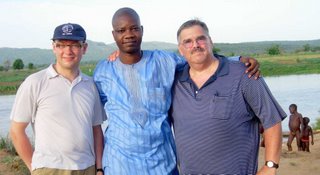
There was no beaten path – we walked down a natural stairway made up of the huge rocks that exposed their bald heads above the ground. As we descended, we met friendly but slightly curious people at work living their lives in and between their huts and the river below. Many employed fences of braided or woven straw or reeds or leaves.
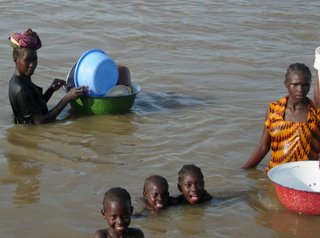
At the river, we watched the children play in the water while their mothers washed metal pots and plastic bowls in the dirty water. A handful of mud seemed to be a good replacement for a scouring pad.
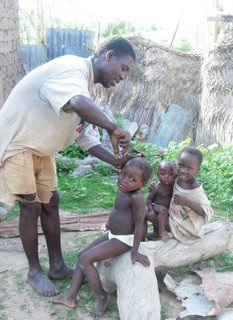
I had made friends with a man named Richard who was cutting his daughter’s hair as we passed. He later caught up with me and showed me how he uses poles sticking out of the water to catch fish. He waded into the murky water and pulled one of them out to reveal the fishing lines and hooks that await the river fish.
They harvest the fish at about 7 p.m., he said. That’s when the fish like to feed. Then, the wives take the catch and sell it outside the village.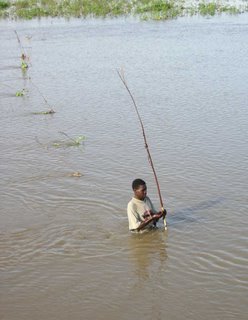
When I asked Richard about the boats I had seen, he took me to a little cove where there were three such boats resting. Two were locked down with a chain, so he rocked the other one back and forth to remove much of the water inside and invited me to join him on the river.
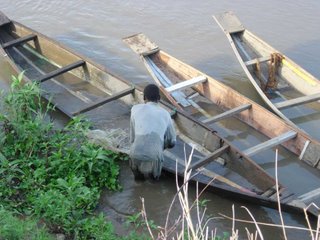
My associates watched with curiosity and a little bit anxiety – they’ve supposed to make sure I survive the Africa trip.

“Don! Tell me you know how to swim,” Marcin shouted to me.

After I returned safely, we interacted with the friendly residents some more and then went to see what everyone else wanted to see – the American University. Afterwards we picked up some suya (their barbecued beef sticks) and returned to the hotel from Hell.
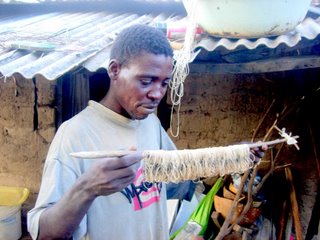
Still no running water. The electricity was on for a while. I ate in my room – but I didn’t sit on the chairs or sofa.
In the morning, I decided that one towel wasn’t sufficient for the sponge bath, so I relied on the fact that we were the last guests there on the last day of our stay. I used one of the pillow cases as a wash cloth.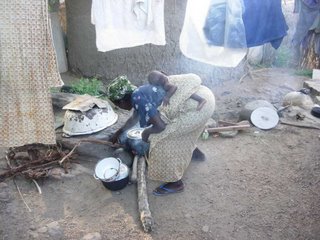
We had ordered (when I say “ordered” I man just that) breakfast the night before. It was awaiting us. Jide didn’t show up to eat, however. We found him at the front desk with a look of anger on his face that would scare away a New York mugger.
He had been careful the day before to make certain that the manager agreed that the hotel would refund about $80 because some of the participants didn’t show up. But this morning, last of the employees to remain at the dying hotel said they didn’t have the money and that the manager had already quit.
Jide wouldn’t accept it. Marcin knew that the manager had planned this theft all along and told them that if they didn’t find the money, he was going to take the television from his room.
I tried to explain to him how this dispute might have to be negotiated from a jail cell if he tried to take a television, but he said this is the only way to deal with these people.
He started up the stairs. The woman at the desk called for security. Of course, security had already been laid off, I think. Jide convinced Marcin to get in the car so we wouldn’t miss our plane to the next city.
Jide had managed to squeeze about $15 of local money out of the people at the hotel. That still left us in the hole, but we’d have to leave to cut our losses. As we were about to leave, the man from the restaurant came with the breakfast bill we hadn’t paid.
“You need to pay for your breakfast,” the woman a the desk said.
We needed something to make us laugh. That was it. We laughed as we got in the car and drove off.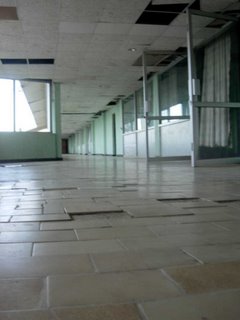
It was in the car that we talked about how we had just experienced the political corruption. The money that was supposed to be maintaining the state-owned hotel went into the pockets of the elected officials and to the godfathers who had funded the vote-buying that put the crooked politicians in office. The godfathers got their money before it went to the hotel and, even worse, before it went to the people of that village. It was a village with no running water. They were drinking the water I was gagging on when I used it to wash my hair. The had little or no electricity. They fed themselves from the river. And just 100 yards up the hill – on the road where we had parked – the rich politicians lived in grand estates that with high walls, metal gates and armed security guards.
The only way to get ahead in Nigeria is to cheat or steal. The richest people steal from the government coffers. The others – like the hotel manager – resort to stealing from the customers. Chances are he didn’t get paid toward the end.
In Nigeria, people grab what they can.
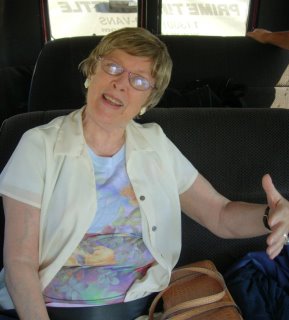 Los Angeles -- Wonderful flight. A bulkhead seat on the aisle with wonderful leg room and a nice guy sitting next to me. Three very good movies. The food was even good. Not a long wait for immigration, baggage or even for the Prime Time shuttle van to Burbank.
Los Angeles -- Wonderful flight. A bulkhead seat on the aisle with wonderful leg room and a nice guy sitting next to me. Three very good movies. The food was even good. Not a long wait for immigration, baggage or even for the Prime Time shuttle van to Burbank.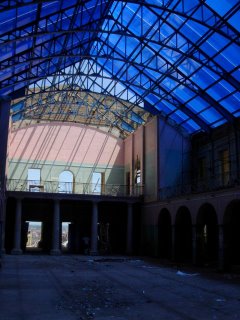 In my last blog entry, I revealed the secret of the last "Mystery Photo" (see way below for the original photo I posted). I'm putting up some other shots of the new roof job atop an historic building the British built in about 1925.
In my last blog entry, I revealed the secret of the last "Mystery Photo" (see way below for the original photo I posted). I'm putting up some other shots of the new roof job atop an historic building the British built in about 1925.